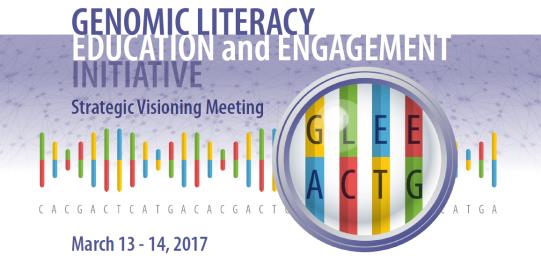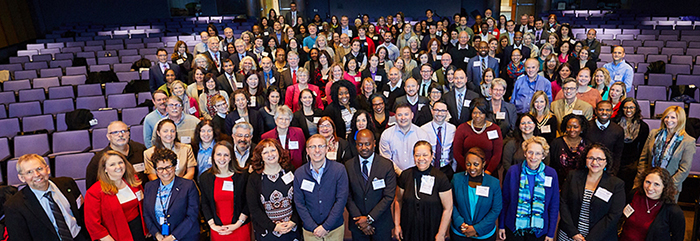Last updated: June 06, 2017
June 6 2017 A Proposed Genomic Literacy Education And Engagement Glee Initiative
The Genomics Landscape
A Proposed Genomic Literacy, Education, and Engagement (GLEE) Initiative
June 6, 2017
 We come into the summer with the good news that the federal budget is settled for Fiscal Year 2017. Even though it felt uncertain for many months with the federal government operating under a series of Continuing Resolutions, we remained open throughout - and now have an approved Fiscal Year 2017 budget that provides increases for both NIH and NHGRI. This is obviously welcome news, and NHGRI's genomics research efforts will certainly benefit from these additional funds.
We come into the summer with the good news that the federal budget is settled for Fiscal Year 2017. Even though it felt uncertain for many months with the federal government operating under a series of Continuing Resolutions, we remained open throughout - and now have an approved Fiscal Year 2017 budget that provides increases for both NIH and NHGRI. This is obviously welcome news, and NHGRI's genomics research efforts will certainly benefit from these additional funds.
This month's The Genomics Landscape features stories about:
- A Proposed Genomic Literacy, Education, and Engagement (GLEE) Initiative
- Genomics and Health Disparities Lecture Series
- Dr. Cynthia Tifft Receives National Organization for Rare Disorders 2017 Rare Impact Award
- NIH Institutional Review Board Training for American Indian and Alaska Native Communities
- Genomics in Photos: NHGRI on Flickr
- Dr. Laura Koehly to Lead NHGRI's Social and Behavioral Research Branch
All the best,
Eric
A Proposed Genomic Literacy, Education, and Engagement (GLEE) Initiative
As genomics becomes increasingly present and relevant in both the public sphere and medical care, there is a clear need to enhance genomic awareness and understanding. Yet, genomic literacy has, in general, not kept pace with genomic advances, and filling this gap is becoming urgent.
In partnership with the Foundation for the National Institutes of Health, NHGRI co-hosted a strategic visioning meeting in March that contemplated the possible establishment and launching of a Genomic Literacy, Education, and Engagement (GLEE) Initiative. GLEE is envisioned as a national campaign to enhance genomic literacy and to close the above-mentioned gap. The meeting was attended by ~160 people from diverse communities, including academia, industry, community-based organizations, non-profits, government, and K-16 education organizations.

NHGRI's interest in helping to catalyze such an effort reflects our long-standing interest in genomics education. Signature programs in this area include the NHGRI-Smithsonian partnership for the Genome: Unlocking Life's Code exhibition and numerous NHGRI-sponsored annual DNA Day events. A possible GLEE Initiative could build on such efforts, likely through the establishment of a public-private partnership that would coordinate and augment ongoing genomics education and outreach activities.
The snowy Bethesda weather during the two March days of the strategic visioning meeting failed to diminish (cool) the enthusiasm for the fundamental tenets of a GLEE Initiative. Discussions focused on solidifying a cohesive vision detailing needs and opportunities related to genomic literacy. Three target audiences were identified: K-16 students, healthcare providers, and the general public. The latter audience included both individuals and communities. In advance of the meeting, a working group for each target audience had been constituted and tasked with formulating possible elements for the overall initiative.
The K-16 working group surveyed educators and found that half of the surveyed teachers do not teach genomics. Reasons for not teaching genomics include: they are not required to do so; they lack appropriate genomic resources; and/or they lack suitable competency in genomics. Therefore, establishing a basic genomic literacy framework would benefit any initiative going forward. Other identified areas of high priority included disseminating existing educational resources, developing new resources, providing authentic training and education experiences in genomics, and continuing to monitor and evaluate ongoing relevant literacy-enhancing projects.
The healthcare provider working group's attention was focused on educating medical professionals who lack formal training in genomics. Increasing genomic literacy for these individuals is especially important as the number of genomic tests that providers can order is steadily increasing. Action items that arose from this discussion included creating effective content by involving the medical practitioners and patients in the design of educational materials, using existing models for implementation to ensure effective dissemination practices, and utilizing tools of implementation science to guide the training of healthcare providers for using genomics in clinical care.

Lastly, the general public/communities working group found that people are generally most interested in learning about genomics with respect to disease prevention, diagnosis, and treatment as well as a tool to understand their ancestry. From the discussions, a plan emerged for collecting more nationally representative data about the public's interests and for developing a national awareness campaign to promote the importance of genomic information in healthcare.
Buoyed by the energetic and passionate discussions at the strategic visioning meeting, steps are now underway to develop a more detailed strategic plan for a possible GLEE Initiative. Because of its fundamental alignment with the Institute's mission, NHGRI aims to play a central role in catalyzing such an effort. More information about the meeting can be found at genome.gov/27568594/genomic-literacy-education-and-engagement-glee-initiative/.
More from The Genomics Landscape:
Genomics and Health Disparities Lecture Series
On June 8, the Genomics and Health Disparities Lecture Series will welcome its sixth speaker - Dr. Mark Cullen, Director of the Stanford Center for Population Health Sciences. This lecture series began two years ago as an effort to enhance opportunities for dialogue about how genomics innovations can affect health disparities. Topics have ranged from basic science to translational research. The speakers - each notable in their field - are chosen by sponsoring partners at NHGRI, the National Heart, Lung and Blood Institute, the National Institute of Diabetes and Digestive and Kidney Diseases, the National Institute on Minority Health and Health Disparities, and the Office of Minority Health at the Food and Drug Administration. Past lectures, speaker profiles, and information about the series is available here. Dr. Cullen's lecture will be held at the NIH Clinical Center's Lipsett Amphitheater at 3:00 and is open to the public. Online viewing is also available at genome.gov/27552682/genometv/. All lectures are videoarchived and can be accessed here.
Dr. Cynthia Tifft Receives National Organization for Rare Disorders 2017 Rare Impact Award
Last month, Cyndi Tifft received the National Organization for Rare Disorders (NORD) 2017 Rare Impact Award. This award is given to someone who has had an incredible impact on the rare disease community. Dr. Tifft, who serves as NHGRI's Deputy Clinical Director, has made major research contributions to help understand a group of rare and devastating neurological disorders known as the gangliosidoses. Dr. Tifft is also Director of the Pediatric Undiagnosed Diseases Program at the NIH, where she works to solve some of the nation's most difficult medical mysteries.
NIH Institutional Review Board Training for American Indian and Alaska Native Communities
The NHGRI Institutional Review Board (IRB), chaired by Dr. Sara Hull, is responsible for protecting the rights and welfare of the human subjects of research conducted by NHGRI intramural investigators. Dr. Hull and her colleagues recently began offering IRB training for American Indian and Alaska Native communities in an effort to help build their research ethics capacity. The training is being conducted in partnership with the National Congress of American Indians and the Indian Health Service. It focuses on genomics research and returning results of genomic studies to clinical trial participants, aiming to address the many challenging ethical questions as well as specific research questions relevant to the tribes. The training takes into consideration the historical, cultural, and political experiences of these communities. Activities include observing NIH IRB meetings, shadowing IRB staff, attending the NIH human subjects research ethics course, and participating in research seminars offered by the NIH Clinical Center's Department of Bioethics. For more information, see genome.gov/27568685/2017-news-feature-community-focus-is-central-to-american-indiansalaska-natives-in-nih-ethics-training/.
Genomics in Photos: NHGRI on Flickr
NHGRI is making it easy for all to view and download the Institute's genomic science and health-related images through Flickr. The Flickr online graphics management and sharing website allows convenient availability of posted graphical images. NHGRI's image gallery contains scientific illustrations, infographics, and photographs, and can be used as a resource for work presentations, school projects, and news reports. All images are in the public domain and can be freely used. The gallery will be updated regularly.
Dr. Laura Koehly to Lead NHGRI's Social and Behavioral Research Branch
Dr. Laura Koehly has been appointed Chief of NHGRI's Social and Behavioral Research Branch. Dr. Koehly joined NHGRI's Intramural Research Program and the Social and Behavioral Research Branch in 2005 as a Tenure-Track Investigator, and received tenure in 2011. Her research aims to understand the social, psychological, and behavioral environment of families and communities at risk for hereditary disease, with emphasis on the intersection between genomic risk information and social relationships. For more information on her appointment, visit genome.gov/27568778/dr-laura-koehly-to-lead-social-and-behavioral-research-branch-at-nhgri/.
NIH & NHGRI News
Testimony on the Transformative Power of Biomedical Research
National Library of Medicine Announces Departure of NCBI Director Dr. David Lipman
Epigenetics Takes Center Stage with this Year's Addiction Science Awards
Appointment of Dr. Alfred Johnson as NIH Deputy Director for Management
Funding News
New NIH Approach to Grant Funding Aimed at Optimizing Stewardship of Taxpayer Dollar
Genomics Research
CRISPR Epigenome Editing Hits the Big Time
Creative Minds: Studying the Human Genome in 3D
NHGRI Researchers Home in on Mutation Profiles of Clear Cell Endometrial Cancer
The Beacon Project Works Towards Privacy Protections
JAMA Launches New Website on Genomics and Precision Health
Notable Accomplishments in Genomic Medicine
Using Genomics to Fight Deadly Parasitic Disease
NIH Researchers Identify Key Regulator of Fetal Growth in Mice
NIH Researchers Find Potential Genetic Cause of Cushing Syndrome
Funding Opportunities
New Videos
National Advisory Council for Human Genome Research - May 2017
Genomic Medicine X: Pharmacogenomics
NHGRI's Oral History Collection: Interview with Elke Jordan
NHGRI's Oral History Collection: Interview with Jeffery Schloss
Past editions of The Genomics Landscape
To receive email updates, sign up for The Genomics Landscape Listserv.
To suggest future topics, please send an e-mail to NHGRILANDSCAPE@MAIL.NIH.GOV
Posted: June 6, 2017
